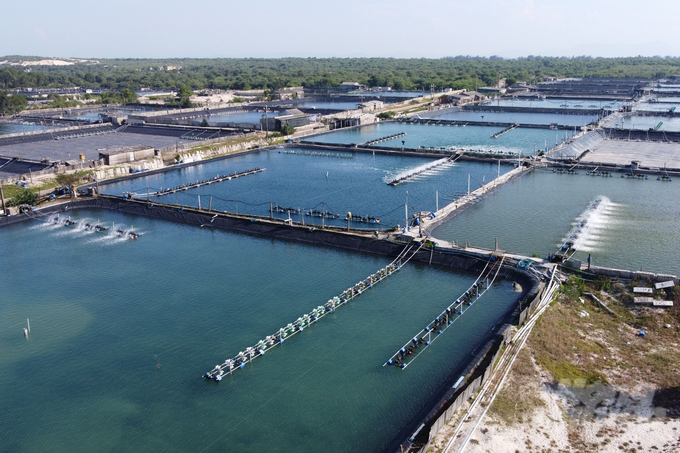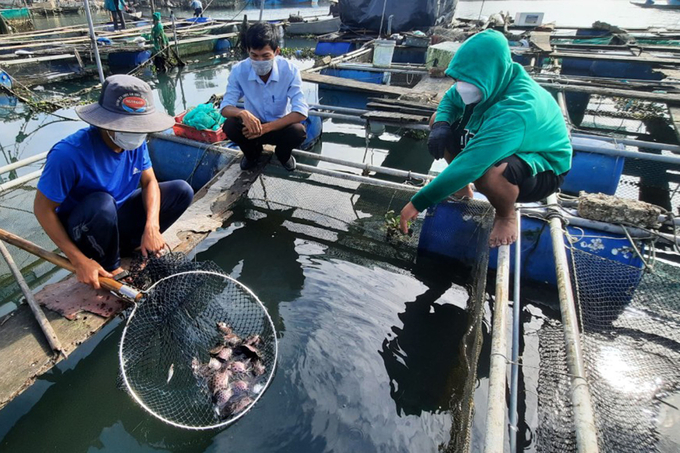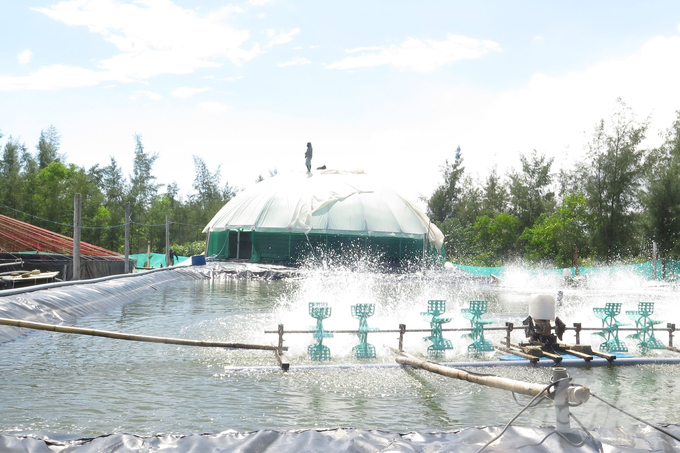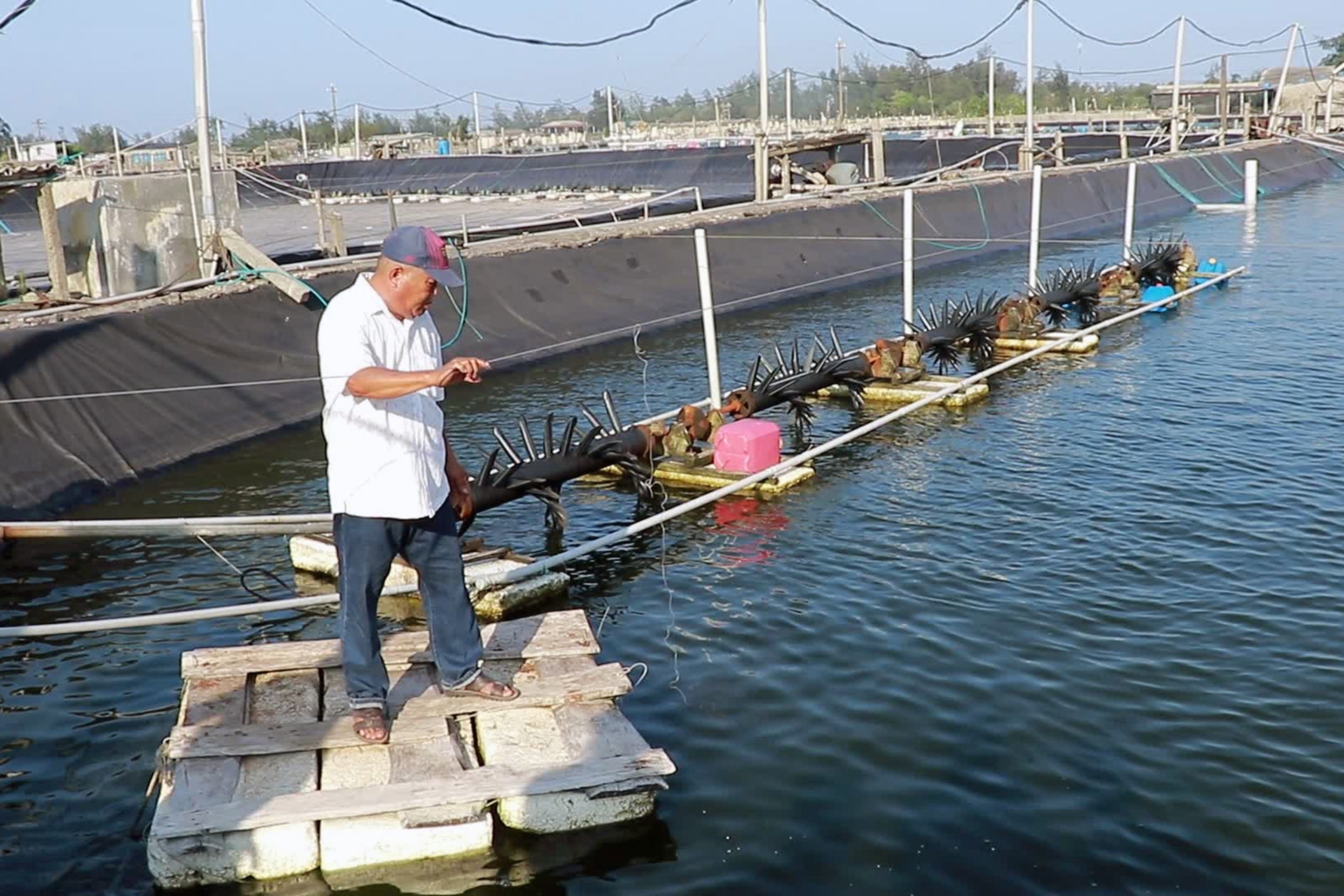May 21, 2025 | 04:23 GMT +7
May 21, 2025 | 04:23 GMT +7
Hotline: 0913.378.918
May 21, 2025 | 04:23 GMT +7
Hotline: 0913.378.918
Many caged fish farming areas in Quang Tho commune, Quang Dien district, which is also the largest concentrated cage fish farming area in Thua Thien - Hue, have reported poor appetite and environmental diseases in farmed fish.
According to local farmers, the shift in fish's behavior was brought on by the prolonged heat. Additionally, the lower water levels in upstream areas have caused environmental changes in rivers and lakes, affecting fish's appetite and reducing their resistance to diseases. Many farmers are concerned about the output because they have spent a fortune on cages, not to mention most of their fish are going through a growth spurt.

Aquaculture farmers in Thua Thien - Hue province are extremely concerned about the prolonged heat. Photo: CD.
Mr. Nguyen Cong Tam's family in Quang Tho commune, Quang Dien district invested in 5 cages for carp farming on the Bo river, all of which are going through their growth spurt. However, a recent loss of appetite and a few deaths among hundreds of near-harvest carp greatly disturbed Mr. Tam.
Mr. Tam reported that the loss of appetite and deaths occurred after the appearance of prolonged heat waves from the beginning of June 2023. Several neighbouring households also share Mr. Tam's concern regarding caged fish farming.
According to Mr. Nguyen Bang in Quang Cong commune,Quang Dien district, the intense heat poses great difficulties for aquaculture households in the region. Accordingly, shrimp and fish are most affected intercropped subjects.
As an experienced aquaculture farmer, Mr. Bang shared that he had to routinely examine the pond's banks and drains it to avoid water loss in the pond. For low water ponds without a pumping system, Mr. Bang recommends farmers to utilize aquatic plants as heat shade for aquatic animals. According to Mr. Bang, farmers need to regulate the appropriate amount of aquafeed to avoid water pollution during the current hot and humid weather.

Aquaculture farmers must follow the governmental guidelines to mitigate damage caused by the intense heat. Photo: CD.
According to Thua Thien - Hue Sub-Department of Fisheries, diseased fish and slow growth during extreme heat waves is relatively common in mconcentrated aquaculture areas such as Quang Dien, Phu Vang, Phu Loc, etc. There is a high risk of disease spreading across farming area because the weather is forecast to remain hot at 39 to 40 degrees Celsius.
In addition to the monitor of changes in environment and water quality, specialized departments have recommended farmers to implement management measures on their aquaculture areas in order to minimize the impact and damage caused by intense heat.
Namely, for aquatic products reared in brackish and salt water ponds, Thua Thien - Hue province's Sub-Department of Fisheries recommends farmers to perform routine inspection of the pond's banks and drains to avoid water leakage. The water level in the pond should be maintained above 1.5 meters to stabilize the water temperature in the pond; orchid nets can be used to cover two-third of the pond surface and 2 meters higher than the water surface to limit solar radiation as well as prevent impact on farmed shrimp and fish.
Most importantly, aquatic products require a reasonable dietary system during extreme weather conditions, depending on the scale and density of farming. Additionally, farmers are advised to supplement vitamin C, trace minerals; mix digestive enzymes with aquafeed every five to seven days to increase resistance to disease.
On the other hand, farmers must keep various environmental factors within their appropriate parameters; monitor the excessive growth of algae and the condition of cultured aquatic products to promptly detect abnormalities, especially in the early morning. Farmers should also limit fishing, spreading and transporting aquatic products during heat waves; in case of absolute necessity, these activities should be carried out early in the morning or during the cool afternoon weather.

High-tech aquaculture is an effective measure to proactively respond to adverse weather conditions. Photo: CD.
For caged aquaculture on rivers, lakes and lagoons, it is necessary to increase the distance between cages for optimal ventilation and water exchange. Orchid nets or coconut leaves can be used to cover the surface of cages and prevent the aquatic products from overheating. Farmers are advised to reduce the density of fish raised in cages and rafts, as well as limit fishing, spreading, transporting, and stocking seeds in during heat waves.
Farmers should prepare aeration machines and equipment, fuel, effervescent pellets to provide oxygen for farmed fish in the event of restricted water flow on Bo river, Dai Giang river, O Lau river due to the halted operation of hydropower and irrigation works.
For freshwater aquaculture in the pond, the water level must be maintained between 1.5 and 2 meters. Farmers should create an alternative source of oxygen for the pond using a fan, aerator or pump. Water hyacinth or duckweed may be placed to cover one-third of pond area to create shade.
For concentrated oyster farming areas, it is necessary to remove mosses or foreign objects attached to the oyster farming rope. Waste around the farming area must be collected for thorough treatment. Dead oysters must be promptly removed to avoid polluting the environment, thereby reducing the growth of bacteria, and limiting the spread of Vibrio bacteria. Farmers should also maintain a suitable farming density to avoid a lack of food sources for oysters, which can inrease the risk of bacterial infections.

Prolonged intense heat increases the risk of disease on aquatic products. Photo: CD.
According to Mr. Le Van Anh, Deputy Director of Thua Thien - Hue province's Department of Agriculture and Rural Development, the Department has formally requested local governements within the province to direct their corresponding Department of Agriculture and Rural Development, the Department of Economic and People's Committee to implement various measures in response to droughts, water shortages and heat waves that threaten aquacultural production.
Accordingly, supplmentary water storage and sedimentation areas will be established in concentrated farming areas. Local governments are asked to collect statistics on areas which frequently suffer from water shortage in order to change aquatic products and to prevent heavy losses for farmers.
Thua Thien Hue province's hydro-meteorological station forecast that the El Nino phenomenon has a 70 to 80% chance of occuring in the second half of 2023 and would remain until 2024. Consequently, intense heatwaves will occur on a large scale and last for many consecutive days from June to early August in Thua Thien - Hue. The highest temperature is expected to fall between 37 and 39 degrees Celsius, with the probability of reach 40 to 42 degrees Celsius in certain locations.
On the other hand, the water level in rivers may be lowered by 25 to 50% lower compared to the yearly average. Irrigation reservoirs in the province currently has a water storage capacity of 86%, and hydropower reservoirs can only reach 44% of designed capacity, which will affect aquaculture production in many areas.
Translated by Nguyen Hai Long

(VAN) Japan's grant aid project contributes to capacity building, promoting organic agricultural production, and fostering sustainable community development in Dong Thap province.

(VAN) For years, the CRISPR-Cas9 genome technology has been reshaping genetic engineering, a precision tool to transform everything from agriculture to medicine.

(VAN) Vietnam aims to become a 'leader' in the region in the capacity and managing effectively soil health and crop nutrition.
![Reducing emissions from rice fields: [Part 1] Farming clean rice together](https://t.ex-cdn.com/nongnghiepmoitruong.vn/608w/files/news/2025/05/05/z6509661417740_a647202949c539012a959e841c03e1d3-nongnghiep-143611.jpg)
(VAN) Growing clean rice helps reduce environmental pollution while increasing income, allowing farmers to feel secure in production and remain committed to their fields for the long term.
/2025/05/19/5136-1-144800_230.jpg)
(VAN) The Nghe An Provincial People's Committee has just approved the list of beneficiaries eligible for revenue from the Emission Reductions Payment Agreement (ERPA) in the North Central region for the year 2025.

(VAN) 14 out of 35 domesticated elephants in Dak Lak province have had their living conditions improved, with 11 of them currently participating in the non-riding elephant tourism model.

(VAN) Muong Nhe Nature Reserve hopes that being upgraded to a national park will lay the foundation for forest protection efforts to be carried out in a systematic, modern, and sustainable manner.